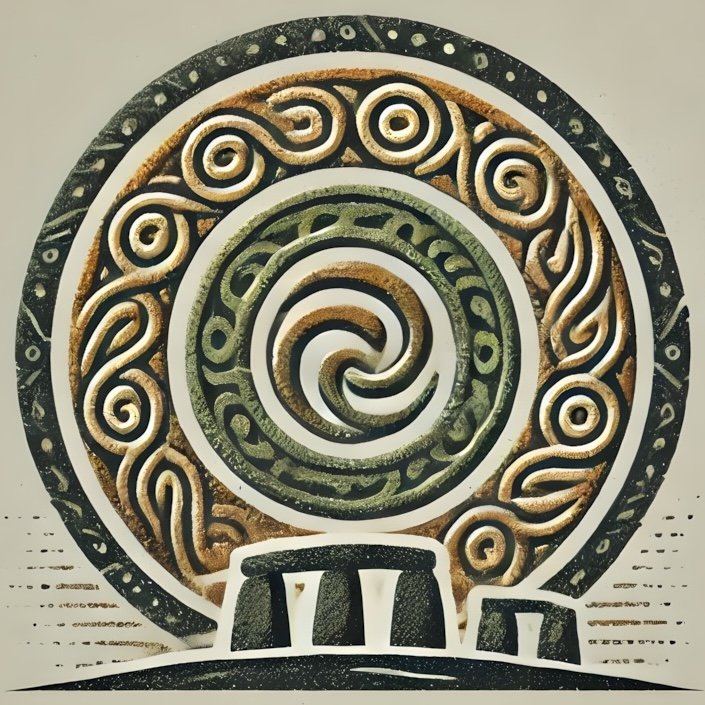The Role of Druids in Ancient Irish Society
In the tapestry of ancient Irish society, Druids occupied a unique and multifaceted role. They were not merely religious figures but were integral to the social, political, and ethical fabric of their time. Revered for their wisdom, the Druids were the keepers of knowledge, the mediators of disputes, and the advisors to kings and leaders. Their influence extended beyond the spiritual realm, shaping the laws and ethics that governed the land. This exploration delves into the various dimensions of Druidic influence, illuminating their pivotal role in ancient Ireland.
Advisors to Kings and Leaders
In a society where kingship was both a revered and precarious position, the counsel of the Druids was invaluable. Druids served as trusted advisors to kings and chieftains, guiding them in matters of governance, warfare, and diplomacy. Their advice was sought not only for their knowledge of the natural and supernatural worlds but also for their understanding of the human condition.
Druids were believed to possess the power of prophecy, which made their counsel particularly prized. They could interpret omens and predict the outcomes of battles or political alliances, thus influencing the decisions of the rulers. This prophetic ability, coupled with their extensive knowledge of history and tradition, allowed Druids to provide guidance that was both strategic and deeply rooted in cultural wisdom.
Moreover, Druids were instrumental in the inauguration ceremonies of kings. They performed rituals to sanctify the king’s rule, invoking the favor of the gods and ensuring the prosperity of the kingdom. This sacred role further cemented their position as essential figures in the political hierarchy of ancient Ireland.
Mediators in Conflicts and Disputes
The Druids’ role as mediators in conflicts and disputes was another crucial aspect of their societal function. In a world where tribal conflicts and personal vendettas could easily escalate into violence, the Druids acted as neutral arbiters. Their reputation for fairness and wisdom made them ideal candidates to resolve disputes, whether between individuals or rival factions.
Druids employed a combination of negotiation, ritual, and legal knowledge to mediate conflicts. They were skilled in the art of rhetoric, able to persuade and placate opposing parties through eloquent speech and logical reasoning. Their interventions often involved invoking traditional laws and customs, reminding disputants of their shared cultural heritage and the importance of maintaining social harmony.
In addition to their role in conflict resolution, Druids also presided over legal proceedings. They were the custodians of Brehon Law, the ancient legal system of Ireland, which was based on customary law and oral tradition. Druids ensured that justice was served, using their deep understanding of the law to deliver fair and impartial judgments.
Druidic Influence on Law and Ethics
The influence of Druids on law and ethics in ancient Irish society was profound. As the interpreters and enforcers of Brehon Law, they played a key role in shaping the legal and moral framework of their time. Brehon Law was characterized by its emphasis on restorative justice, focusing on restitution and compensation rather than punishment. This approach reflected the Druids’ belief in balance and harmony, both in the natural world and in human society.
Druids were responsible for maintaining and transmitting the vast corpus of legal knowledge, which was preserved through oral tradition. Their training involved years of rigorous study, during which they memorized complex legal codes and precedents. This mastery of the law enabled them to act as judges and legal advisors, ensuring that justice was administered fairly and consistently.
Ethically, Druids promoted values such as honor, integrity, and respect for the natural world. These principles were woven into the fabric of Brehon Law, influencing the behavior and attitudes of the people. The Druids’ teachings emphasized the interconnectedness of all life and the importance of living in harmony with nature, a philosophy that resonated deeply with the agrarian society of ancient Ireland.
Keepers of Knowledge and Tradition
Beyond their roles as advisors, mediators, and legal authorities, Druids were also the keepers of knowledge and tradition. They were the intellectual elite of their society, responsible for preserving and transmitting the collective wisdom of their people. This included not only legal and historical knowledge but also the myths, legends, and genealogies that formed the cultural identity of the Irish.
Druids were skilled poets and storytellers, using their talents to educate and inspire. Through their recitations of epic tales and heroic sagas, they kept alive the memory of past generations and instilled a sense of pride and continuity in their audience. These stories were more than mere entertainment; they were moral and ethical guides, teaching lessons about bravery, loyalty, and the consequences of one’s actions.
In addition to their role in preserving cultural heritage, Druids were also scholars of the natural world. They studied the stars, the seasons, and the cycles of nature, using this knowledge to inform their rituals and agricultural practices. Their understanding of the natural world was both practical and spiritual, reflecting their belief in the sacredness of all creation.
Spiritual Leaders and Healers
While the Druids’ influence extended into many areas of society, they were fundamentally spiritual leaders. They officiated at religious ceremonies, conducted rituals, and served as intermediaries between the human and divine realms. Their spiritual authority was derived from their deep connection to the natural world and their ability to harness its energies.
Druids were also healers, possessing knowledge of herbal medicine and healing practices. They used their understanding of plants and their properties to treat ailments and promote well-being. This healing aspect of their role was intertwined with their spiritual duties, as they sought to restore balance and harmony to both the body and the soul.
In their role as spiritual leaders, Druids also played a part in the education of the young. They were responsible for the training of future generations of Druids, ensuring the continuity of their traditions and knowledge. This education was holistic, encompassing not only religious and spiritual teachings but also practical skills and ethical principles.
In conclusion, the role of Druids in ancient Irish society was complex and multifaceted. They were the guiding force behind the spiritual, legal, and ethical framework of their time, shaping the culture and identity of the Irish people. Through their wisdom, knowledge, and spiritual insight, the Druids left an indelible mark on the history of Ireland, one that continues to resonate in the myths and landscapes of the modern world.

